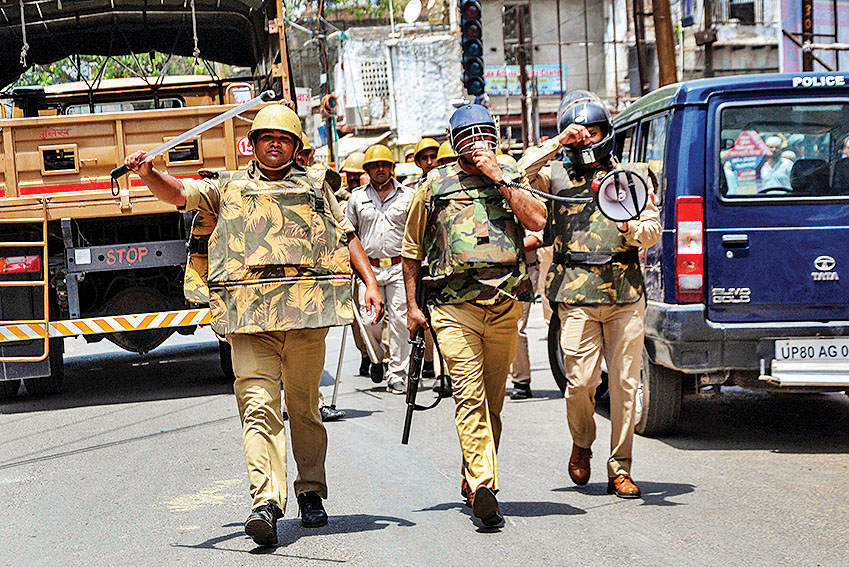It’s not only nondescript villages of Uttar Pradesh where lower castes face discrimination. In Delhi too, Dalits and minorities find their rights being violated
The film Article 15 has received rave reviews. People are calling it a film much needed for our times, for people to really understand the depth of discrimination that permeates India’s institutions and its social fabric.
Article 15 of the Indian Constitution prohibits the state from discriminating against any citizen on the grounds of religion, race, caste, sex and place of birth.
Patriot speaks to a few people living in Delhi who have faced discrimination. While there may not have been direct injustice inflicted by the state, the fact that it continues can be seen as the state being unable to defend this right of the people.
Caste
Delhi has infamously been unable to stop the practice of manual scavenging which led to 11 deaths in 2018. Most of the people made to do this unlawful and degrading work belong to the Dalit community and sub-castes like Valmiki, Bhangi, Mehtar and Lalbegi. A study by Dalberg Advisors says in the 53 interviews they conducted of manual scavengers, 96% of the workers were from these sub-castes.
Discrimination does not just happen within the poor community but also against white-collar workers, says Tej Singh who belongs to the Dalit community and was one of the founding members of Bahujan Swayamsewak Sanghathan.
He retired as a deputy commissioner from the Customs and Excise department when his first ever posting opened his eyes.
I was selected as a Provisional officer in 1978, that time I was still in my village of Bhadwas in Uttar Pradesh. Some villagers called me for a feast in the village, but I didn’t go. I felt something was wrong.
The food that was prepared for me was thrown away and four dogs died after consuming it. This incident shocked me. I understood that some people couldn’t digest the fact that I was going to do something big, that a person from the Dalit community may achieve something more than them.
Around the same time, I started working as an assistant to the late Kanshi Ram, founder of the Bahujan Samaj Party. I was with him till 1995 and learnt a lot.
When I started working in Delhi, I noticed that good posting and positions were not being given to people of the Dalit community. They still discriminate when it comes to postings. When I saw this, I made an association called Customs and Central Welfare Association for SC/ST and that is how I managed to rise to the top despite many wanting to pull us down.
Discrimination against us is rampant in every walk of life. Even the educated do it in government establishments and religion has helped them continue their bigotry.
But the thing is casteism is a mental sickness, embedded in people’s brains.
Look at the reservation in government services for SC/ST, only about .01% may have benefited from it. No matter which government comes to power, they have done nothing for us. And they will not stop the atrocities against us but will try and remove the Act which is against atrocity on SC/ST (Scheduled Caste and Scheduled Tribe (Prevention of Atrocities) Act, 1989).
Religion
Human Rights Watch in its 2019 report calls the Indian government out for its failure “to prevent or credibly investigate growing mob attacks on religious minorities, marginalized communities, and critics of the government”.
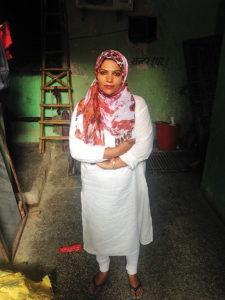
“Mob violence by extremist Hindu groups affiliated with the ruling BJP against minority communities, especially Muslims, continued throughout the year amid rumours that they traded or killed cows for beef. As of November, there had been 18 such attacks, and eight people killed during the year,” it says.
Acutely aware of these developments, we set out to see how the Muslim community in the heart of the city feels. We met Tabassum Naaz a few days after a fight over a parking space in Chawri Bazaar threatened to boil over into a communal flare-up.
The tension among residents in her building was palpable when a fight broke out on the floor above. Naaz ran out —everyone was out of their homes, scared.
When people confirmed that it wasn’t a case of “outsiders” creating trouble, we went back inside. Naaz told us that they have been living in fear, with people constantly warning them against stepping out.
Naaz lives in an area of Old Delhi with a concentration of Muslims. She was born in the same area and grew up here. She was married at the age of 17 when she had just entered 12th grade.
By 2011, she was running her own teaching centre for girls where she taught a 6-month course to 150-200 girls under the Centre’s HRD Ministry scheme Hunar.
Soon after the BJP government came to power, however in 2014, the Hunar programme was dismantled and now she has just about 20 girls in a batch. This is her story:
We got this programme when Kapil Sibal was the HRD minister under the Congress government. Many girls joined to learn some skill; they would be taken to Zakir Hussain College which was their exam centre – they were in awe of the place because they had never seen anything like it. Then when they completed their course, they would be given a certificate with so much honour. It was a great joy for us.
Now I run the centre from one room; earlier, it was a two-room establishment run from my apartment building.
I have struggled from early childhood. My elder brother used to do printing of banners and posters at home so he wanted me to help him. I said I would work but only after school. We were four boys and two sisters, my younger brothers would work for Rs 10 a day. We were very poor.
Neither my father nor my mother was educated, and my elder brothers tried to dictate my life. I would go to school and come back and that’s all I did. I wore a burqa till I got married.
If you’re wearing a burqa or you’re a man with a beard or a skull cap — then they can come at you any time. The situation is such that people are feeling emboldened now to do things against us Muslims. On social media they are so open with their threats: They call us terrorists.
But the irony here is that people who are against us, say Muslim women who wear a full burqa are being suppressed. And when there’s a woman wearing short clothes, they say the rape happened because of her clothes. So, women of no religion are safe.
I can speak about many instances of discrimination due to my faith, but right now I want to speak about my son. He was a young boy when I got him admission somehow into Kendriya Vidyalaya in Gole Market.
While I didn’t study in a good school, I wanted my son to have a different life. Till 4th grade it was fine. But then when he entered 5th grade — it coincided with the year 2014 when the BJP government came to power — teachers changed.
My son was nicknamed ‘Mullah’, they made him sit in the back bench. He would be punished many times and made to stand out in the sun. Once he went onto the stage and was pushed by a student.
I was very upset about it. My son didn’t want to go to school but we kept forcing him. We would hit him, scold him, force him to go.
I would say, ‘Let people say whatever, just go and study.’ Somehow, he finished his 8th grade but refused to continue in the school. This was because a teacher hit him, pulled his hair and threw him out of the class for bringing the wrong books to school.
He said this teacher would fail him and that it didn’t matter how hard he studied, he would be failed because he is Muslim. Imagine such a young boy thinking like this. I was so sad that my son was going through this and also that my dream to see him graduate from a good school would not come true.
We had to withdraw him and now he is in the Open School system.
Attack on Christians
A report by the Religious Liberty Commission of the Evangelical Fellowship of India says that hate crimes and targeted violence against Christians in India during the first two months of 2019 showed a jump of 57% over the same period in 2018.
More recently, on June 23, a pastor serving in Swatantra Nagar, Narela, saw his Sunday service disrupted by a large group of religious fanatics, accusing him of deceiving people and luring them into conversion.
We spoke with Pastor Suresh and this is his account:
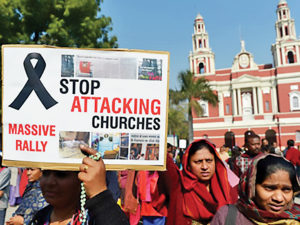
I have been a Pastor since 2001 and have faced no untoward incident until that Sunday.
Some people already had information that something would happen that day. I had been warned but I didn’t take it seriously. I thought maybe 10-20 people might show up but I didn’t know 150 people would come to disrupt our church service held in the evening of June 23 at a marriage hall.
This same space had been used by us to hold meetings for the past three years.
They asked us questions about what we were up to and spoke to the church attendees. I asked them if we were scaring anyone, forcing anyone, or giving them money? When we weren’t, then what was the meaning of them coming there and stopping us? I said, do what you want to.
They left but it didn’t stop there. The following week on Saturday four men reached my home and told me, “Practice your faith at home but not outside with others”.
When I showed no sign of relenting, they went to my landlord, telling him I was up to no good and that I should be evicted. But my landlord supported me. He said these people are from the “Sangh” and “I don’t have any problem with you”.
That Sunday though, we had a smaller gathering of people. People have been telling me to stop taking the service for some time. I don’t know what to do. I haven’t gone to the police either. I don’t know how to go about it. People have been saying that the matter would worsen if I go to the police.
These people have a problem because no one in my church was born into a Christian family —they have all converted by faith alone. These fundamentalists see their
neighbours have become Christians and they cannot fathom it.
Sometimes I fear for our lives. We plan to mobilise some boys to defend our church. Till the time we keep surrendering to them, they will keep doing this to us. So, we will not surrender. We will have our own youth who will stand guard.
We cannot be mere spectators we need to protect ourselves.
Place of Birth
It is no news that people from North-eastern states of the country are subjected to racial slurs and biases when they move to another state far from home. The way they dress, what they eat, to even the way they look, is somehow a bone of contention for many in various parts of the country, including Delhi, Bangalore and Chennai which see many North-easterners moving to for studies or better job prospects.
We spoke with Temshi Tzudir, who moved to Delhi in 2013 and has since called it home. Here is his account:
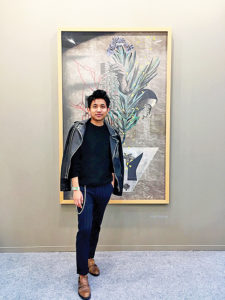
Before I moved to Delhi I was warned about many things. The heat was definitely something I dreaded the most, but the stories about the racial slurs, the different names I would get called, and the way I would be stared at was definitely something I was not looking forward to but was prepared for.
The city lived up to every bit of what others have warned me about.
I have been called the many names they like to use for North-easterners like Chinky, Chinese, Nepali, momos…
It’s not always to my face, it will be passing commentary, and mumbles behind my back.
But I have to admit, while I was well prepared for what was to come, the first few weeks were pretty rough. For a person coming from such a small and laid-back town like Dimapur in Nagaland, I did not understand Delhi at all.
I’ve been subjected to racial vilification whilst in college, when taking public transport or even when I am just walking down the street. I have been told to go back to where I came from, looked at with contempt, and questioned about my food choices…
It is sad but most of us are accustomed to it by now and we choose not to let that affect us. To be honest, I think that’s the best way to go about it. We have to realise, there’s going to be good and bad people everywhere.
But the real discrimination that I have felt, not just by people calling me names, is when real estate brokers say I cannot look at a particular flat because the owners do not want to rent it out to North-eastern people.
Having lived in Safdarjung Enclave, I feel it’s easier for a lot of people here. Especially if you’ve newly moved into the city, then there’s a sense of safety and security because there are so many living here from our community.
Gender
In India, the gender ratio gap is testament to the practice of female foeticide. The discrimination against half of the population begins even before their birth when illegal sex determination centres give some couples and/or family the chance to terminate the pregnancy.
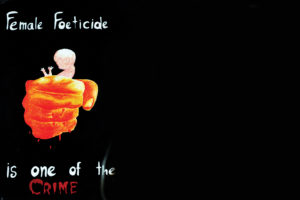
This can be seen in Delhi as well, with the last census of 2011 putting the sex ratio at 868 girls against 1,000 boys. Anushree Bernard, Project Coordinator at Vanishing Girls — an initiative of ADF India to stop the practice of female foeticide by focusing on strict implementation of the Pre-Conception and Pre-Natal (Prohibition of Sex Selection) Act (PCPNDT Act) and by raising awareness — tells us that while the national average child sex ratio is 919 girls against 1,000, Delhi despite being the Capital, has an even lower child ratio at 871 girls against 1,000 boys.
Furthermore, she brought up an important fact that from the 11 districts in Delhi, according to the 2011 census, South Delhi district was the one with the lowest child sex ratio at 885 girls per 1,000 boys. This is even lower than the previous Census data from 2001 which shows 888 girls per 1,000 boys.
Bernard says that this shows a contrast that the more affluent you are, the more problematic it is. “Because sex determination is a crime, it costs a lot of money to get the test done illegally. So, these people have the money to spend,” she points out.
“Female foeticide is not merely a rural problem, it’s more an urban one. It’s as bad in the metro cities of India.”
The two things people point out as to why they take such a step as female foeticide is fear and economic bondage, says Bernard. The fear is: security of the girl who would be born into a country with high rate of violence against them and the economic bondage from practices like dowry — which although illegal is still rampant.
In 2018, according to the Delhi police, there were 2,043 cases of rape in Delhi. Molestation cases were 3,175 and eve teasing was at 569. The NCRB data available from 2016 shows 162 victims of dowry deaths in Delhi.
While laws are in place to safeguard against these social evils, their implementation is still weak.
Sexual orientation
The year 2018 was historical one which saw gay sex being decriminalised. It gave millions of people legitimacy, and freed them from a law which had earlier made them criminals.
Prateek Sachdeva, who has been living in Delhi his whole life, says that he’s lucky to have been born in an era when people have been more aware and open about homosexuals. What the generations before him endured and still some people do in different parts of the country is immeasurable.
Here’s his story:
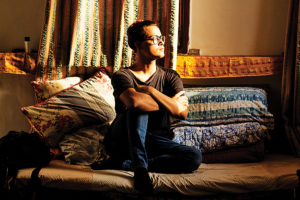
While I came out to myself, it was some time before I started to interact with people of my community. While discrimination is rife, it depends on what part of the city you are in.
I have been treated with contempt just because I look feminine. The usual stares and sniggers because I’m not buff, and don’t fit into their definition of what a male person should look like.
In fact, I faced that since school days. I was never good at sports, never good at studies either, so I was a laughing stock quite often.
I am a freelance dancer and even in this workspace have faced discrimination. Sometimes they want someone more masculine, because of which I have lost out on a lot of performances. I have seen the people who get picked —they don’t have half the training I have. I will see myself in the back alley with the rejects and the reason is not my dancing, but that I lacked the cookie-cut masculinity they want.
If I look at past generations, I have been fortunate to be part of this one, which has not had to face as tough a fight as the ones before us. I can’t even imagine what they would have gone through. When I was younger, people knew about the word, while they may have had a negative perception, they still knew what it was.
A positive account I will share was from the Delhi Metro. As I was waiting to go through the security check, one of the guards asked me, because I look feminine, if I wanted to go to the female line. I said no, I’m fine. That was very nice of him. Of course, that was just the one. But that really reassured me that we are going in the right direction.

